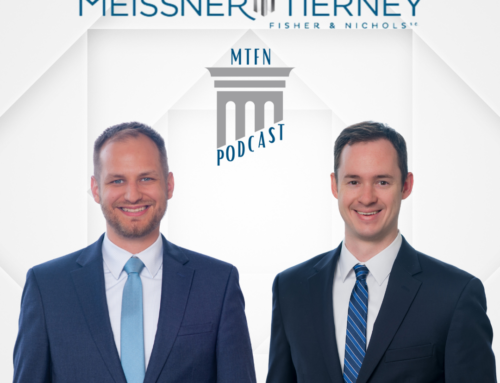One area of business litigation that we often address is the issue of enforceability of non-compete agreements in Wisconsin. A non-compete agreement is a written agreement between an employer and employee that prohibits the employee, after termination of employment, from specific activities within a specific time period and a specific geographic area. Wisconsin has a statute, Section 103.465, that addresses non-compete agreements and provides that if the non-compete agreement is reasonably necessary to protect the employer and is reasonable in geographic scope and reasonable in time limitation, it will be enforceable. This is an area where there is quite a bit of case law and if the non-compete is carefully drafted in accordance with the most recent case law in the area, courts will enforce them.
In terms of its scope when we’re dealing with a sale of the business or sale of assets of a business, the statute does not specifically apply and the strict scrutiny under the statute is inapplicable. The courts look to five factors in determining the enforceability a non-compete agreement. The five factors are:
- Is the restriction reasonably necessary to protect the employer?
- Is the restriction reasonable in terms of time limitation?
- Is the restriction reasonable in geographic scope?
- Is the restriction unduly hard on the employee?
- Does the restriction violate public policy?
The burden of proof is on the employer to establish the reasonableness of the non-compete restriction. In general, non-compete agreements are disfavored in the law and are construed in favor of the employee. The first element in the analysis is probably the most important and that is, is there a legitimate protectable interest on the part of the employer? The law provides that an employer cannot restrict ordinary competition that a stranger could provide, thus there must be special facts and circumstances which support the justification for the non-compete. The law has identified three basic justifications for non-compete restriction:
- The protection of customer contacts
- The protection of confidential information that may have been provided to the employee over time
- The courts have recognized that a non-compete may be necessary when there is some special or unique skill that the employee provides
These justifications for the enforceability of a non-compete raise several factual issues inherent in every case. What was the nature of the employee’s relationship with the customer? How long was that relationship? Is the customer a current customer or a past customer?
In 2009 the Wisconsin Supreme Court, for the first time in the Star Direct case, determined that an employer could have a legitimate protectable interest in a relationship with a former customer, in the sense that the employer would be interested in winning back that customer. Other factual issues that are at play in analyzing a legitimate protectable interest prong, are whether the employee had access to vital, confidential information of the employer that needs to be protected. That can relate to questions of how current was the information? Is it outdated? How important is the information? Was the information of the type that would make a competitive difference in terms of pricing information, margins, customer needs, etc.?
The second prong in the analysis is whether the restrictive covenant is reasonable as to time. Reasonableness is determined based on the facts and circumstances of the specific case and there are no hard and fast rules with respect to what is a reasonable period of time. However, the Wisconsin courts have recognized that a two year time limitation is reasonable.
The third prong in the analysis is whether the restrictive covenant is reasonable as to territorial limitation. As with the restriction for time, the reasonableness of the territorial restriction is determined based on the facts and circumstances of the particular case. The courts have held that the restriction does not have to be expressed in terms of specific geographic limitations, rather, it can be expressed in terms of a customer list or a specific set of activities that the employee had engaged in. In terms of customer list, it would be prudent to draft the non-compete restriction to provide for fluidity in terms of expansion of the customers or retraction of the customers, so as to make it more likely that the restriction which would be found to be reasonable. A restriction that goes beyond the employer’s scope of business or where the employer actually does business will be deemed unenforceable in Wisconsin.
The fourth factor in the analysis is whether the restrictive covenant is unduly harsh or oppressive to the employee. Courts generally do not like restrictive covenants that preclude an employee from working anywhere in the marketplace. Courts look at multiple factors in determining whether the restraint is oppressive to the employee, such as the employee’s age, education, physical condition, general economic conditions and the restrictions impact on the employee’s freedom to utilize his or her skills.
The last factor in the analysis is whether the restrictive covenant violates public policy. Courts generally will recognize that a restrictive covenant violates public policy if it creates a shortage of the services that the employee provides or creates a monopoly.
In summary, although non-compete restrictions are disfavored in the law, they will be enforced by the courts if the court finds that they’re reasonably necessary to protect the legitimate protectable interest of the employer and are reasonable in terms of time and territorial restriction. This requires an understanding of the employer’s business and their real legitimate protectable interests. It also requires a fervent study of the law in keeping up in this complex area.






